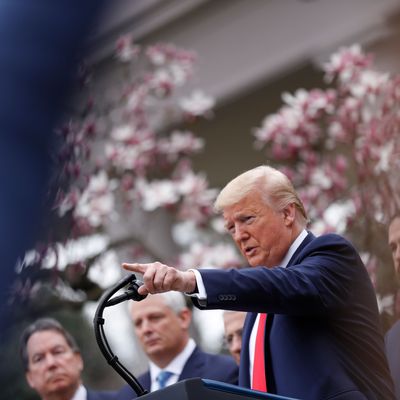
At his Rose Garden press conference, President Trump attempted yet again to perform his mastery of the coronavirus. The president invited a procession of corporate chieftains, who — along with his faithful vice-president — lavished him with his customary praise. The purpose was to make Trump look, if only superficially, like a regular president.
Trump immediately sabotaged the display by eschewing his prepared text. CNN reported that Trump attributed his disastrous speech Wednesday night on his teleprompter (Trump “complained about the teleprompter from which he read the speech, blaming it for various stumbles including his inaccurate announcement that cargo would be included in the travel ban.”) Perhaps in reaction, this speech used prepared notes instead.
But this decision led to Trump’s characteristic habit of interspersing bullet point notes with little riffs, which create the appearance of a man encountering the words for the first time. “I am officially declaring a national emergency, two very big words.” When he announced his intention to have the federal government buy and store excess oil, he added the move was “Making us even further toward that wonderful goal that we’ve already achieved, of energy independence,” simultaneously announcing the goal would get closer but had already been achieved. He touted the decision by several athletic leagues to halt play: “It’s incredible what’s happening with sports. With the sports … Problems could be caused.”
The contrast in semantic fluency between Trump and the parade of business figures he invited to speak only underscored his haplessness. They were able to speak in complete sentences and use high school-level vocabulary terms, while he couldn’t. Trump even persisted in offering a series of handshakes — a practice health authorities are trying to eradicate — until one of the executives offered an elbow bump instead. The all-but-explicit message is that the federal government, and its oafish leader, is so inept that only the private sector is able to save us.
Trump tried to reassure his audience that his corporate partners had finally resolved the testing crisis that had left the United States, almost singularly in the world, unable to determine how many Americans had contracted the coronavirus. Trump repeated again his boast that fewer Americans had the coronavirus than in other countries. “Frankly, the numbers, because of the steps that have been taken, are at a level that a lot of people are surprised, especially when you compare them with other places, with far smaller populations,” he bragged. Of course the numbers may well be lower only because the United States has almost no capacity to find out how many Americans are infected. The number Trump is citing as his measure of success is the measure of failure.
Trump attempted to blame the government’s failure to deploy tests on the Obama administration, which has departed more than three years ago. The shirking of responsibility is self-evidently absurd: if Obama’s supposed red tape had prevented the Centers for Disease Control from handling the coronavirus, why didn’t Trump cut through it weeks ago, when the virus first alarmed health officials?
A reporter asked the president if he took responsibility for the failure of the government he leads to resolve this sooner. “No,” he replied, “I don’t take responsibility at all”.
Another reporter asked if he took responsibility for dissolving the White House office charged with coordinating responses to pandemics. (Beth Cameron, its former director, has an op-ed explaining how damaging this move was.) Trump denied any responsibility for this decision, too. “You say me, I didn’t do it … I don’t know about that,” he huffed, calling the query a “nasty question,” and cutting off the reporter’s microphone.
Harry Truman once said, “The buck stops here.” It is the most hackneyed cliche about the presidency, and leadership in general. Trump has never had to follow this principle, in a career that ran from inheriting $400 million from his father through various bankruptcies. Trump instead follows the ethos of a different famous leader — Tony Soprano, who once said, “Shit runs down hill, money goes up.”
Trump’s most historically bizarre belief is that he can not only claim credit for every good thing that happens under his watch — primarily the continuation of the recovery he inherited — while shirking responsibility for all the bad onto others. The longer he holds office, the the ratio of the former to the latter continues to shrink. He is likely to discover that pretending to be a real president is not enough.






























